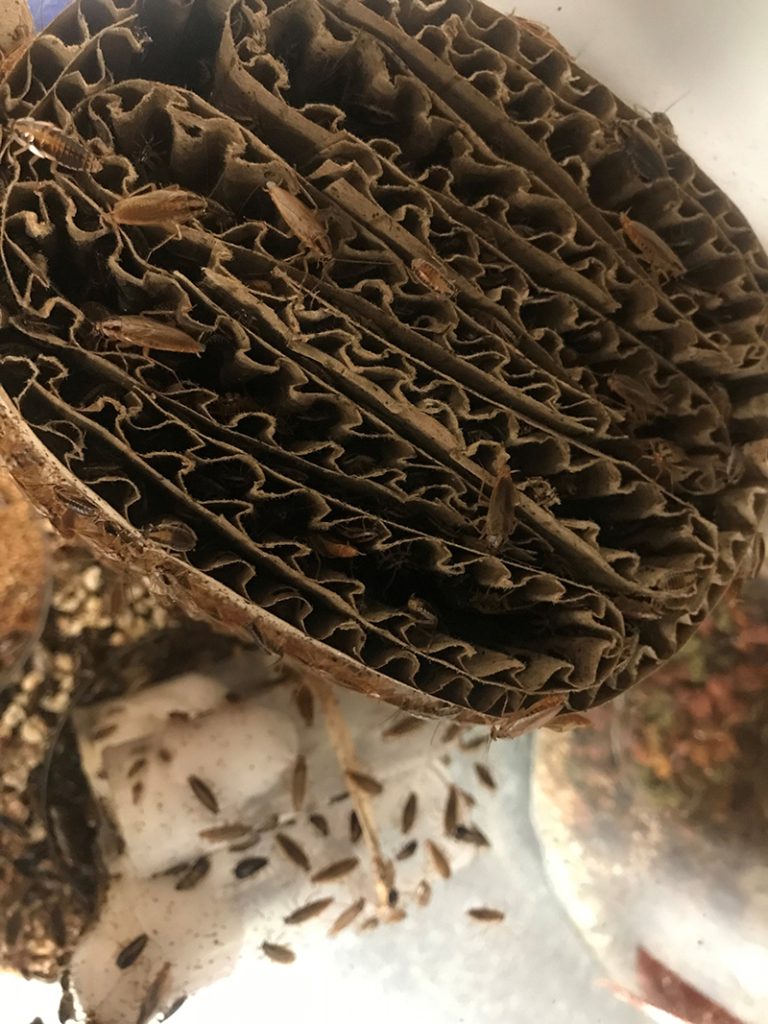Above: A German cockroach. Photo by James Castner, UF/IFAS entomology and nematology department
- Scientists studying insecticide-resistance in German cockroaches, a major pest, discovered that the insecticide-resistant roaches used in their study were mostly free of parasites that can impact public health.
- The study also identified the genetic changes that allow German cockroaches to develop insecticide resistance over just a few generations.
- Future research will investigate whether these genetic changes follow a predictable pattern that could help pest control professions finetune insecticide use.
Scientists studying insecticide-resistance in German cockroaches, a major pest, have made a surprising discovery: The insecticide-resistant roaches used in their study had lower amounts of parasites that can affect human health.
Most German cockroaches — a small species of roach known to infest homes and businesses — carry microscopic parasites and leave them in their droppings. These parasites can trigger allergies, asthma and other health issues in people exposed to them, said Michael Scharf, the study’s first author and endowed professor in urban entomology in the UF/IFAS entomology and nematology department.
“In this study, our initial focus was not on the parasites but on learning which genes the roaches were passing on that enabled their offspring to survive the insecticide. Our genetic analysis showed that those later generations were increasing their expression of detoxication genes,” Scharf said. “To process a roach for genetic analysis, you end up processing both the roach and the parasites living inside of it. This is when we found that insecticide-resistant roaches contained less parasite DNA than their non-resistant counterparts, evidence that the former carry lower amounts of parasites.”
The insecticide-resistant roaches were also visibly healthier, with long, straight antennae and shiny wings, Scharf said, another sign that they not experiencing parasites.
Previous studies have shown that roaches and their parasites disproportionally affect those living in low-income households. This study’s surprising findings suggest insecticides used to control roaches may reduce the public health impact of these pests in more ways than previously thought. However, the study only tested one relatively new insecticide, so the researchers are not yet sure if other insecticides have this added benefit.

These questions aside, the study did identify several genes in German cockroaches linked to the ability to survive the insecticide tested. The scientists pinpointed these genes by conducting a lab experiment involving about a thousand German cockroaches.
First the roaches were separated into two groups. One group, called the control group, was allowed to live and reproduce undisturbed. The second group, called the experimental group, was exposed to the insecticide. Most of the roaches in this group died, but not all of them. Those survivors went on to reproduce with each other. This second generation was also exposed to the insecticide, and the survivors also went on to reproduce with each other. The process repeated until the researchers reach the sixth generation of roaches.
“By the sixth generation, we compared each groups’ response to the insecticide. The experimental group was able to survive a dose that was 25-times higher than what the control group could survive,” Scharf said.
The lab experiment mimicked what can happen in a home or business with a roach infestation, he said.
When roaches infest a house or apartment, they are a self-contained population, meaning the roaches only reproduce with other roaches in the building. When insecticide is used, it wipes out the portion of the roach population that is vulnerable to the insecticide. The roaches that do survive, however, reproduce with each other and pass on the genetic traits that allowed them to survive.
German cockroaches reproduce about every three months, so insecticide resistance can emerge rather quickly. Now that Scharf’s lab has identified the genes in play, the next step is to determine if successive generations of roaches inherit the ability to better survive the insecticide in a predictable way.
“With this knowledge, we could be able to fine tune insecticide applications in a way that keeps us one step ahead of resistance, while at the same time promoting healthier indoor environments” Scharf said.
The study, which includes several co-authors at Purdue University, is published in the journal Frontiers in Physiology.
 1
1
